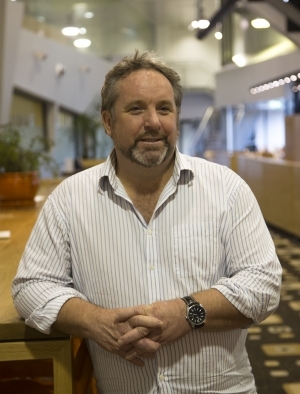Metals dynamo to forge new links for Deakin
Research news
Having shaped a stunning reputation for himself and Deakin through establishing the world class Institute for Frontier Materials, Professor Peter Hodgson has just gained a whole new hotbed of challenges through the appointment as Deakin’s first Pro Vice-Chancellor (Strategic Partnerships).
In this role, Prof Hodgson will work across faculties and research centres to lead new large scale research collaborations within Australia and internationally.
The appointment should be a fillip for the Geelong region, with Prof Hodgson already having played a key role in seeding innovative high tech industries, such as Carbon Revolution, HeiQ Australia and Cytomatrix, which are all co-located at Deakin’s Waurn Ponds campus.
Since joining Deakin from BHP Research in 1996, Peter has helped to mastermind the development of Deakin’s materials capacity, becoming Director of the Centre for Material and Fibre Innovation in 2006, and inaugural Director of the Institute for Frontier Materials (IFM) in 2008.
He has overseen the evolution of the IFM to become a world leader in fibres, metals and composites research, and in the emerging areas of electromaterials, corrosion, nanofibre and nanotechnology.
The IFM is now Deakin’s largest research complex, supporting around 300 researchers and being home to the cutting edge Carbon Nexus – the world’s largest university carbon fibre research facility.
In his new role, Prof Hodgson will take a strategic approach to progressing Deakin’s large network of established partnerships, particularly in India, Indonesia and China. His goals will be to strengthen existing and build new academic / research / commercial partnerships and grow international student numbers.
“We are taking a more sophisticated and holistic approach so that we can make our presence known in a competitive global market,” he explained.
“Today, the silos within universities need to break down as many industries are seeking solutions across disciplines. For instance, one organisation might be seeking assistance in areas as diverse as materials, big data, or economic analysis. By working together at Deakin, we can maximise opportunities for the university and the wider region.”
“Deakin offers Geelong a unique platform into the world,” he added. “We have a story to tell, we have world class expertise, and we are bringing key people into Geelong.”
“Many people know that Deakin’s materials and engineering areas are ranked well above world standard, but they may not know that Deakin is above world standard in 16 distinct areas of research and at world standard in many others.”
Professor Hodgson’s 30 years traversing the tarmac to India, China and many other Asian countries have fine-tuned his ability to build relationships across geographic and cultural barriers.
He has helped to develop many international partnerships for Deakin and is particularly proud of the partnership with The Energy and Resources Institute (TERI) in India, which led to the establishment of the TERI-Deakin Nanobiotechnology Research Centre in 2010 and the construction of a $10 million state-of-the-art facility near New Delhi that will be completed in October this year.
The centre focusses on advanced nanotechnology development for agricultural and biomedical applications and will support up to 50 Deakin PhD students and 20 researchers within five years.
Prof Hodgson also has strong ties in China and is a member of the Hubei Province’s “100 Talents” program, which calls on 100 of the world’s brightest intellects to address challenges within the province. He is also a “1000 Talent” of the Central government.
His often hard-won experience has provided a realistic understanding of what it takes to achieve long-term success.
“We don’t try to look for a quick fix,” he explained. “Building international relationships is like a dance. It is a matter of having depth and meaning on both sides.
"Each country and each business has its own needs. It is a matter of developing a strategy for each country and for Deakin staff and partners to work together to identify how we can leverage more from our partnerships.”
Prof Hodgson has handed over the reins of IFM Director to a highly capable successor, Professor Xungai Wang, but he will continue to maintain some involvement with his “first love” - materials research.
Share this story
 Deakin's Pro Vice-Chancellor (Strategic Partnerships) Professor Peter Hodgson.
Deakin's Pro Vice-Chancellor (Strategic Partnerships) Professor Peter Hodgson.
